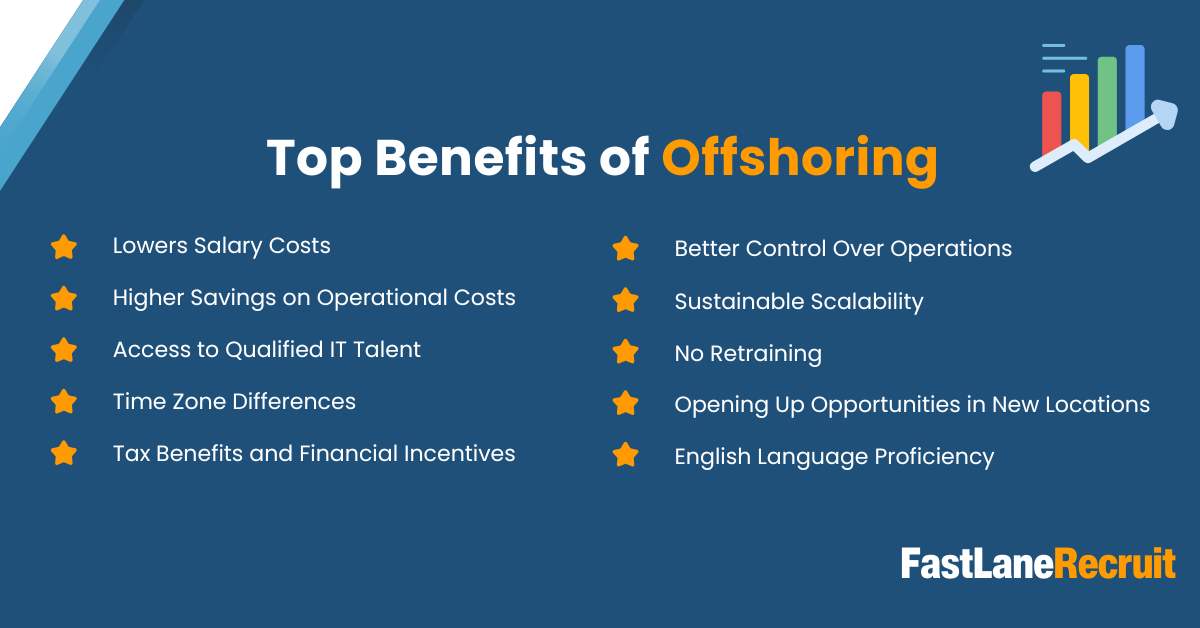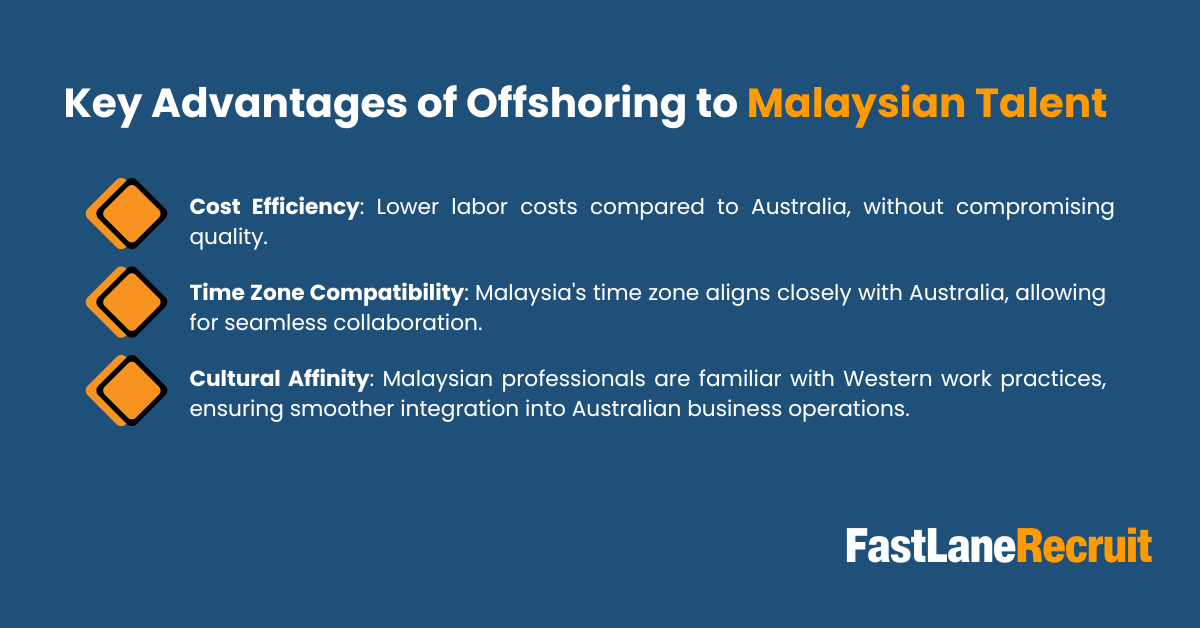In today’s globalized economy, offshoring has become a strategic tool for businesses aiming to optimize operations, reduce costs, and access a wider talent pool. However, like any business strategy, offshoring comes with its own set of advantages and challenges. In this blog, we will explore the benefits and drawbacks of offshoring, helping you make an informed decision for your business. Whether you’re a startup or an established enterprise, understanding the pros and cons of offshoring is crucial to leveraging its full potential.
Content Outline
Key Summary
Offshoring is a Strategic Business Move
Businesses relocate operations overseas to reduce costs, access skilled talent, and improve efficiency.
Significant Cost Savings
Lower salary and operational costs in offshore locations allow companies to reinvest savings into growth and innovation.
Access to Specialized Talent
Countries like Malaysia offer a strong pool of IT, finance, and customer service professionals.
Time Zone Differences Can Be an Advantage
Offshoring enables businesses to operate round-the-clock, improving customer support and project turnaround times.
Tax Benefits Enhance Financial Gains
Many offshore destinations provide tax incentives to attract foreign businesses.
Cultural and Communication Challenges Exist
Companies must address language barriers, cultural differences, and time zone adjustments for smooth collaboration.
Malaysia is a Prime Offshoring Destination
With cost efficiency, a skilled workforce, and time zone compatibility with Australia, Malaysia offers a strong offshoring advantage.
Partnering with FastLaneRecruit Simplifies Offshoring
Working with specialists like FastLaneRecruit ensures a seamless offshoring experience, from recruitment to operations.
What is Offshoring?
Offshoring is the practice of relocating business operations or services to another country, typically to take advantage of lower costs, a skilled workforce, or favourable economic conditions. Companies in various industries, from IT and customer service to manufacturing and finance, use offshoring to enhance efficiency and remain competitive in the global market.
Unlike outsourcing, where third-party vendors handle specific business functions, offshoring allows businesses to establish their own offshore teams or subsidiaries. This strategic approach enables greater control over operations, processes, and quality while benefiting from the economic advantages of the chosen location.
Read More How to Choose an Offshore Provider for Your Business
Top Benefits of Offshoring

1. Lowers Salary Costs
One of the primary reasons companies opt for offshoring is the significant reduction in salary costs. Countries like Malaysia, India, the Philippines, and Vietnam offer highly skilled professionals at a fraction of the cost compared to developed nations. This cost advantage enables businesses to maintain a skilled workforce without compromising on quality.
This cost advantage allows businesses to allocate resources more effectively, investing the savings into other critical areas such as research and development, marketing, or expansion. By lowering salary costs, offshoring enables companies to maintain competitiveness in an increasingly global market.
2. Higher Savings on Operational Costs
Beyond salary reductions, offshoring also helps businesses cut operational expenses. Office rental, utilities, and infrastructure costs in offshore locations are considerably lower than in developed economies, further enhancing financial savings.
Companies can reinvest these savings into core business functions, research and development, or marketing, ensuring continued growth while maintaining cost efficiency. For example, a company that offshores its IT support can use the savings to develop new products or improve customer service, ultimately enhancing its market position.
3. Access to Qualified IT Talent
The IT industry benefits significantly from offshoring, as many offshore destinations have a strong pool of highly skilled technology professionals. Countries like Malaysia, India, and the Philippines have well-established IT industries, producing graduates with expertise in software development, cybersecurity, and data analytics.
By tapping into this talent pool, businesses can ensure they have the right expertise to drive innovation and maintain a competitive edge. This is especially beneficial for companies in industries that require specialized skills, such as software development, cybersecurity, and data analytics.
4. Time Zone Differences
While time zone differences can sometimes pose coordination challenges, they can also offer a competitive edge—especially for Australian companies offshoring to Malaysia.
Australia and Malaysia share a minimal time difference (usually just 2–3 hours depending on daylight saving), which makes real-time collaboration seamless. Your Malaysian team can easily align with Australian business hours, ensuring smooth communication and workflow without the delays often associated with offshoring to more distant time zones.
At the same time, this slight time gap also opens up the potential for extended coverage. For example, your Malaysian team can start early and prep for the day ahead before your Australian office opens, or continue tasks after hours to help shorten turnaround times. This can be especially valuable for industries like accounting, tech support, or customer service, where timely responses and round-the-clock efficiency improve both productivity and client satisfaction.
Offshoring to Malaysia combines the best of both worlds: cost efficiency and time zone compatibility, allowing Australian businesses to scale operations without compromising on control or communication.
Read More Offshoring vs. Freelancing: Which is Better for Your Business?
5. Better Control Over Operations
Unlike outsourcing, offshoring allows businesses to retain direct control over their processes, staff, and overall operations. Companies can set up dedicated offshore teams that align with their corporate culture, values, and quality standards.
This approach ensures consistent performance, streamlined workflows, and better management of intellectual property, reducing risks associated with third-party involvement.
6. Sustainable Scalability
Offshoring provides businesses with the flexibility to scale operations up or down based on demand. Whether you’re expanding into new markets or adjusting to seasonal fluctuations, an offshore team can be easily scaled to meet your needs without the constraints of local labour markets.
This scalability is especially beneficial for startups and small businesses that may not have the resources to hire full-time employees locally. By offshoring, they can access the talent and infrastructure needed to grow without incurring significant upfront costs.
7. No Retraining
When you offshore, you gain access to a workforce that is already trained and experienced in the specific skills your business requires. This eliminates the need for extensive retraining, saving both time and money.
For example, if you offshore your software development to a country like Malaysia, you can hire developers who are already proficient in the latest programming languages and technologies. This allows you to hit the ground running and focus on achieving your business objectives.
8. Opening Up Opportunities in New Locations
Offshoring not only reduces costs but also opens up opportunities to establish a presence in new markets. By setting up operations in a foreign country, you can gain valuable insights into local consumer behaviour, preferences, and trends.
This knowledge can be leveraged to tailor your products or services to meet the needs of the local market, giving you a competitive advantage. Additionally, having a physical presence in a new location can enhance your brand’s credibility and visibility.
9. English Language Proficiency
Many popular offshore destinations have a high level of English proficiency, particularly in countries like the Philippines, India, and Malaysia. This linguistic advantage minimizes communication barriers, ensuring smooth collaboration between onshore and offshore teams.
Effective communication is critical to the success of any offshoring initiative, and English proficiency ensures that your offshore team can understand and execute your requirements accurately. This is particularly important for roles that involve customer interaction, such as call centers or technical support.
Read More 8 Offshoring Myths And Truth About Building Remote Team
Disadvantages of Offshoring
1. Language and Communication Barriers
Despite the high level of English proficiency in many offshoring destinations, language barriers can still arise. Differences in accents, dialects, and colloquialisms can sometimes lead to misunderstandings, particularly in roles that require clear and precise communication.
To overcome this challenge, it’s important to invest in communication training and tools that facilitate effective collaboration. Regular meetings and feedback sessions can also help bridge any gaps and ensure that everyone is on the same page.
2. Cultural and Social Issues
Cultural differences can impact the way business is conducted and how teams interact. For example, communication styles, work ethics, and hierarchical structures may vary significantly between countries. These differences can sometimes lead to conflicts or misunderstandings within teams.
To address this, businesses should prioritize cultural sensitivity training and foster an inclusive work environment. Encouraging open communication and mutual respect can help build strong relationships between onshore and offshore teams.
3. Quality Control Problems
Maintaining consistent quality across offshore operations can be challenging, especially when teams operate independently. Differences in production standards, regulations, and work methodologies can affect product or service quality.
To mitigate this risk, it’s crucial to establish clear quality control processes and conduct regular audits. Providing detailed guidelines and training can also help ensure that the offshore team adheres to your standards.
4. Time Zone Adjustments
While time zone differences can be advantageous, they can also create scheduling challenges. Coordinating meetings, project timelines, and real-time collaboration may require adjustments to accommodate different working hours.
To address this, businesses should leverage technology such as project management tools and communication platforms that facilitate asynchronous collaboration. Setting clear expectations and deadlines can also help minimize the impact of time zone differences.
How to Choose the Right Offshoring Location
Selecting the right offshoring location is critical to the success of your strategy. Factors to consider include the availability of skilled talent, cost of living, political stability, and infrastructure. For example, Malaysia is a popular choice for IT offshoring due to its large pool of tech talent, while the Philippines is favoured for customer service roles because of its English proficiency and cultural affinity with Western countries.
Additionally, it’s important to evaluate the legal and regulatory environment of the potential offshoring destination. Understanding local labour laws, tax policies, and data protection regulations can help you avoid potential pitfalls and ensure compliance.
Offshoring to Malaysian Talents
Malaysia has become a preferred offshoring destination for Australian businesses due to its skilled workforce, cultural compatibility and strong English proficiency. The country is known for its expertise in IT, finance, shared services and customer support.
Key advantages of offshoring to Malaysia include:
- Cost Efficiency: Lower labor costs compared to Australia, without compromising quality.
- Time Zone Compatibility: Malaysia’s time zone aligns closely with Australia, allowing for seamless collaboration.
- Cultural Affinity: Malaysian professionals are familiar with Western work practices, ensuring smoother integration into Australian business operations.
By offshoring Malaysian talents, businesses can enjoy high-quality services while maintaining close coordination and communication.

Gain the Full Potential of Offshoring with FastLaneRecruit
Offshoring offers numerous benefits, from cost savings to access to top talent and business scalability. However, it also comes with challenges that require careful planning and management.
At FastLaneRecruit, we specialize in helping businesses navigate the complexities of offshoring and maximize its benefits. From identifying the right talent to setting up operations, our team provides end-to-end support to ensure a seamless offshoring experience. By partnering with FastLaneRecruit, you can access a global talent pool, reduce operational costs, and achieve sustainable growth. Our expertise in recruitment and offshore management ensures that you can focus on your core business while we handle the rest. Contact us today to learn how we can help you unlock the full potential of offshoring.
FAQs
1. What is offshoring and how does it benefit Australian businesses?
Offshoring involves relocating business processes or services to another country to access skilled talent, reduce costs, and increase operational efficiency. For Australian businesses, offshoring provides access to a global talent pool, helps address local skills shortages, and enables scalability without high overheads.
2. Why is offshoring a strategic solution to Australia’s skills shortage?
Australia faces a growing shortage of skilled professionals across industries like IT, finance, and engineering. Offshoring helps bridge this gap by connecting Australian businesses with qualified global talent, ensuring critical roles are filled quickly and cost-effectively.
3. Why is Malaysia a preferred offshoring destination for Australian companies?
Malaysian talent is in high demand due to strong English proficiency, cultural compatibility, and cost efficiency. Malaysia’s close time zone alignment with Australia also enables real-time collaboration, making it an ideal offshoring destination for Australian businesses.
4. How does offshoring help Australian businesses save costs?
Offshoring reduces labour and operational expenses, with salaries in countries like Malaysia up to 70% lower than in Australia. This allows businesses to increase profit margins and reallocate resources to innovation, growth, or strategic initiatives.
5. Can offshoring improve business flexibility and scalability?
Yes. Offshoring enables Australian companies to scale their workforce quickly in response to demand fluctuations. Whether you need to expand during peak seasons or downsize temporarily, offshoring offers flexibility without long-term commitments.
6. How does offshoring support round-the-clock business operations?
By working with offshore teams in different time zones, Australian businesses can ensure 24/7 productivity. While local teams rest, offshore teams continue operations, which is especially valuable for customer support, IT services, and global service delivery.
7. How can FastLaneRecruit help with offshoring for Australian businesses?
FastLaneRecruit offers tailored offshoring solutions by connecting Australian companies with top-tier offshore talent. From recruitment and onboarding to ongoing management, FastLaneRecruit ensures a seamless and compliant offshoring experience that drives business success.


